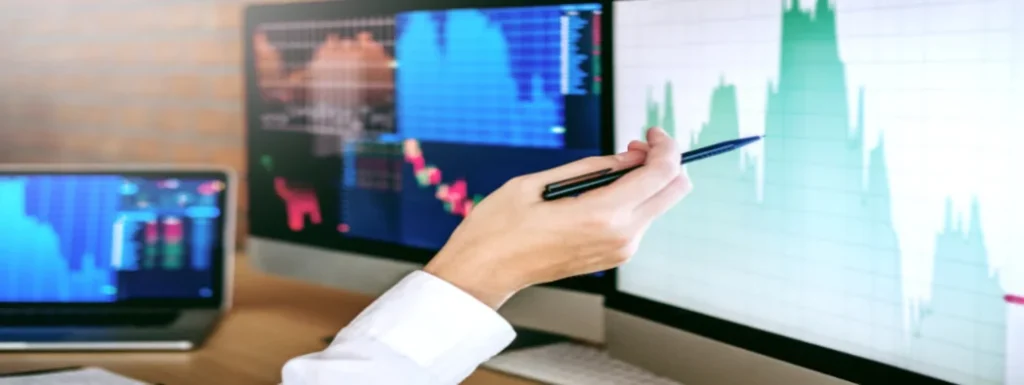Most beginning traders understand the importance of having a good trading strategy. However, it is only after you have a trading strategy that is congruent with your personality and lifestyle that adhering to the trading strategy becomes possible. This is paramount as a trader.
In this article, we focus on scalping and day trading.
Key Points
- Scalping involves high leverage and very short-term trades to capitalize on numerous small gains, whereas day trading closes positions within a single day to avoid overnight market risk.
- Scalpers operate on seconds-to-minutes time frames, focusing on one or two markets, while day traders work on minutes-to-hours time frames and can handle more markets.
- Both scalping and day trading require a focused personality, with scalping demanding more intensity and rapid decision-making due to the higher frequency of trades.
Comparing Scalping and Day Trading
There are many styles of trading: scalping, day trading, swing trading, and position trading. The difference that sets these styles apart is the length of time that trades are held open.
The biggest difference between scalping and day trading is the trade duration.
Scalp trades are held for a few minutes at a time. Trades under day trading style are held for from a few minutes to a few hours. Swing trades are often held for a few days, and position trades are held from a few days to even several years.
The following table summarises scalping and day trading:
| Scalping | Day Trading | |
| Trade duration | From a few seconds to a few minutes | From a few minutes to a few hours |
| Trades closed before market close | Yes | Yes |
| Trading frequency | Higher | Lower |
| Catalyst for trades | Range-based trading, news trading | Ranged-based trading, news trading |
| Personality | Highly focused and decisive | Focused |
Scalping Explained

Scalping trades happen very quickly, and they can last as little as a few seconds. Often, a scalp trader would enter the next trade in the opposite direction. This is the hallmark of scalp trading.
Scalping typically involves using a high level of leverage and is a very short-term trading method used to create opportunities from the volume of trades placed.
Scalping has the shortest trading cycle. It got its name because traders (scalpers) who adopt quickly enter and exit the market to skim potential returns throughout a trading day.
In practice, scalping can be extremely difficult; it requires very quick reactions, a good understanding of the markets you are trading, and protecting your accounts from excessive commissions. It also requires endless hours of practice to develop a good grasp of the chosen markets. For this reason, you rarely see scalpers trading more than one or two markets, since it is extremely difficult to focus on a handful of markets throughout the day.
Commonly, a scalper trader would use a 30-minute chart to generate levels of support and resistance. Once the market reaches those levels, they would be using simple price action and order flow tools such as cumulative volume delta, footprint or tape reading to see participation at the levels.
Day Trading Explained
Day trading usually refers to the practice of opening and closing a position within a single trading day. It can occur in any marketplace but is most common in the Forex and stock markets. Day traders also utilise high levels of leverage and short-term trading strategies to create potential returns on small price movements that occur in highly liquid stocks or currencies.
Day traders will close all positions before the market closes every trading day. This is a hallmark of day trading, and this avoids unmanageable risks and negative price gaps between one day’s close and the next day’s price at the open.
Unlike scalpers, the goal of day traders is to trade intraday swings in price and stay in trades as long as possible.
Day traders aim to create opportunities on short-term market volatility. Trading based on the news is a popular technique. Scheduled announcements such as economic statistics, corporate earnings, or interest rates are subject to market expectations and market psychology. Markets react when those expectations are not met or are exceeded—usually with sudden, significant moves—which can greatly benefit day traders.
Scalping vs. Day Trading: Factors to Consider
Your personality and your lifestyle are the two most important factors in determining your trading style.
Lifestyle and Available Time
Understanding how much time each day or each week you can consistently dedicate to trading is important in deciding your trading style.
If trading is something to which you can only commit a few hours a day, then your lifestyle allows you to be either a swing trader or a day trader.
Both scalping and day trading requires high trading volume and market volatility.
Conclusion
If you prefer not to hold positions after market close, and you enjoy quick action, have hyper-focus, as well as not easily distracted, scalping and day trading can be a good fit for you.
If you only have a few hours a day or a week to trade, you can still be a scalper or a day trader – as long as the hours also coincide with the high market volatility. Otherwise, swing trading is more likely to be suitable for your lifestyle.



